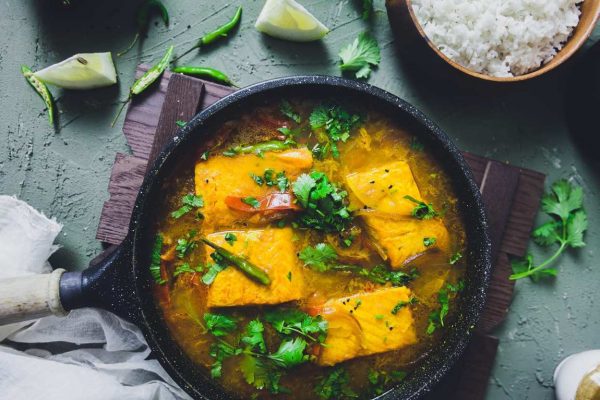My lovely aunt Keya gave me this fish curry recipe when I interviewed her for a memoir I have written. The memoir contains the stories of 7 women, including Keya, and my mother, who recount their early lives in India, and the new lives they made in England. Many years later, England has now been home for the majority of their adulthood. Here, they have raised their children and planted roots, although they still have deep roots that will forever remain in their beloved India too. They all have intertwined memories, and have shared many of the joys, the challenges and the sorrows of life. We, their children, have inherited as deep a bond, one that has passed into our cells and filled them so they are plump with unconditional love.

I loved talking to these dear women, and watching them cooking their food, which is very much part of their essence. Each of the women grew up in different regions of India, and therefore has her own style of cooking; but the beauty of their long and deep friendship is that they have influenced one another’s culinary style, and ended up with a ‘mix and match’ of meals, with tweaks here and there. Sharing culinary tips cemented their bond and demonstrated their love for one another.
It was a privilege to spend days chatting to them and allowing them space and time to recount their amazing life stores. They clearly made brave decisions to move with their new husbands to an unfamiliar country, England, and to come to accept it as their home. I saw their eyes light up as I listened to them talk about two countries with equal fondness- India, their motherland, and England, to whom they are immensely grateful for taking them in and allowing them, and their respective families, to flourish.
So here is Keya’s everyday fish curry, a staple in Bengali homes. It has now been passed to me, and I have cooked it many times. Everyone loves it, revels in the fresh, clean flavours, and the simplicity of the ingredients. I have also tweaked the recipe on occasions, so that I continue to add a little of my own essence to it. I sometimes add a little coconut milk, or a few cherry tomatoes 5 minutes before it is ready, and often throw in a seasonal green, such as samphire.
There is a delicious sentiment in the act of passing on recipes, especially from one generation to another. It keeps the memories and the stories of people’s journeys alive, which is, after all, part of the richness of life.
Try the recipe, and perhaps try my additions, or tweak it to your taste.
Macher Jhol – Everyday Bengali Fish Curry
This simple and typical Bengali fish curry is fiery and filling, and uses panch phoran (literally meaning 5 spices) mix, which is a spice box must-have for every Bengali cook. It consists of equal amounts of the seeds of black mustard, fennel, cumin, nigella, and fenugreek. You can make your own mix, and store it in a glass jar, so you have it ready for the next time you make this curry- because you certainly will want to make it again!
This recipe uses salmon steaks, but it also works just as well with trout, sea bass, and bream. Every Bengali household has its own adaptation of macher jhol, but Keya’s version is just perfect.
Ingredients to serve 4:
4 organic salmon steaks
1 tsp ground turmeric
1 tsp salt
½ tsp chilli powder
A pinch of sugar
½- 1 tsp panch phoran
2 tbsp rapeseed oil
3 tsp English mustard paste
2 small green chillies, de-seeded, sliced in half lengthways
300 ml water
A handful of fresh coriander leaves, washed and roughly chopped
A fresh lime or two
Method:
Wash the salmon in tepid water and pat dry with kitchen paper. Rub the fish with a mixture of half a teaspoon each of the turmeric and salt and leave to marinade for at least 15 minutes.
In a deep, wide frying pan, heat the oil, and when it is hot, add the chillies and the panch phoran. Cover with a lid as it will spit a little at this stage. Once it starts to go slightly brown, add the fish and cook for a few minutes on both sides. Whilst the fish is cooking, make up a mixture with the mustard paste, the remaining turmeric and salt, the sugar and the chilli powder. Add 200 ml of the water and stir well. Add this to the fish and pour in the remaining water. The fish should be half immersed in the water. Bring to boiling point, cover with a lid and cook on a medium heat for around 10 minutes or until the sauce is reduced and slightly thickened. Squeeze a little lime juice in and taste/adjust. You want a little zingy, zesty taste to cut through the sauce.
Serve with freshly cooked basmati rice, and garnish with the coriander and a wedge of lime
